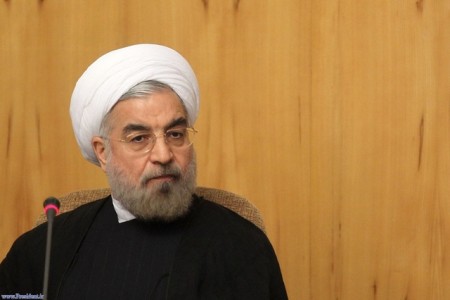Perhaps, in an Iran where film is monitored, censored, and banned for political content, it was inevitable that a documentary on the President would cause controversy.
In late March, the documentary, “I am Rouhani” — covering Hassan Rouhani’s life from the 1980s Iran-Iraq War to his role in the regime’s response to the 1999 student protests — was premiered at Tehran University. Screenings at other universities followed, and the video has appeared on YouTube.
The announcement of the film’s premiere was hailed as showing the President’s “revolutionary background”, questions and criticism soon followed. Tabnak challenged, “Who is behind the scenes of the film ‘I Am Rouhani?’” and quoted the Speaker of Parliament, Ali Larijani, that the documentary was “disseminating information that is untrue”.
Javan Online said the film was “the latest excuse to criticize those who are critical of the (Rouhani) administration”.
The attacks on the film are not only coming from the conservative media. Leading political analyst Sadedgh Zibakalam said the documentary was an attack on the President which revealed the “moral collapse” of those opposed to Rohani: “One of the most basic methods of distortion is to narrate a story without a preface and a postscript or without giving [context].”
The documentary has been challenged over its portrayal of Rouhani’s involvement — on the command of his political mentor, former President Hashemi Rafsanjani — in the secret “Iran-Contra” talks with US officials in the 1980s.
Speaker of Parliament Ali Larijani lashed out at the producers of the film, “They’ve accused the President of having been involved in the MacFarlane affair. That is a lie. Do you also want to lie to history?”
The film also claims Rouhani secretly tried to make peace with Iraq during the 1980-1988 War, against the wishes of Ayatollah Khomeini.
Last weekend, the President’s office was pushed to respond. An unnamed member of the staff said, “Information in certain parts of this film is incorrect. Over the past year we have warned the producers of the documentary to correct (these issues), but they haven’t done so.”
Screenings at Allameh Tabatabaei University, Amirkabir University, Birjand University, and Shahid Beheshti University have now been cancelled.
The suspension of the screenings may not be enough to satisfy critics, however. Iran Prosecutor General Gholam-Hossein Mohseni Ejei said on Tuesday, “I am not aware of the film’s content, but Tehran’s prosecutor is investigating the matter.”
(h/t Hanif Zarrabi-Kashani)

